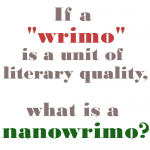 I realize this is not going to be a popular sentiment on the eve of National Novel Writing Month, but I find the entire enterprise misguided and detrimental to both the art and business of fiction writing.
I realize this is not going to be a popular sentiment on the eve of National Novel Writing Month, but I find the entire enterprise misguided and detrimental to both the art and business of fiction writing.
And, I say that as an unpublished author trying to break into publishing. I’m not pouring hot oil on the heads of barbarians from atop the alabaster walls of literary privilege. No, I am also on the outside of the city, watching the hordes fling their latest “vampire slayer” or “vampire romance” tale at the towering slush piles of the citadel of literary agency,* and wishing that they might disperse so the city gates could be opened to allow more regular commerce.
Luckily for me, I am not alone in my disdain for what is basically the storytelling equivalent of flash dating. Other amateur pundits have trashed found fault with the growing NaNoWriMo phenomenon as well. My favorite deconstruction of the pretenses of this drecksprint is by Eric Rosenfield, who wrote in 2006:
To the NaNoWriMo people, writing a novel is like running a marathon, something difficult and strenuous that you do only so you can say you did it before you died. (Or rather, like running a marathon has become in the popular imagination; there are those who still lament the passing of the age when marathons were for serious runners only.) I shouldn’t have to say that this attitude is repugnant, and pollutes the world with volumes upon volumes of one-off novels by people who don’t really care about novel writing. I can’t help but wonder out of all those 59,000 people, how many of them will ever write another word.
It is this quality of quasi-genuine meta-participation — that half-ass middle ground between being a fan-spectator and a sincere participant — that makes NaNoWriMo such a bad idea. According to the project’s own website, out of tens of thousands of “novels” written, there has been one bestseller and only a few dozen published at all. And, even accepting the 50,000-word NaNoWriMo goal as novel-length, the project still consistently results in an over 80 percent failure rate.
Rosenfield’s pollution metaphor is apt: the project taps sources of superficial enthusiasm for writing, but spits out Niles, Mississippis, and Amazons of very real text that wash out into the sea of writing where more serious and sincere writers, agents, and publishers live and breathe. As Paul Combs pointed out in 2007:
For many, it is a month-long excuse to meet friends at Starbucks while pretending to hammer out a few hundred words. For some it’s exactly what [NaNoWriMo founder] Chris Baty originally envisioned: a way to meet girls.
 So, the project has been insincere from its inception, not so much about writing itself as it is about exploiting the glamor of writing for various non-literary ends.
So, the project has been insincere from its inception, not so much about writing itself as it is about exploiting the glamor of writing for various non-literary ends.
Now, there’s nothing wrong with the glamor of writing, but those swept up in it should use their enthusiasm to buy and read more novels, and encourage others to do the same — particularly in these troubled times for the publishing industry — rather than flooding an already crowded field with “Hey mom, look what I can do!” antics.
As recently as a few weeks ago, Zoe Whitten characterized NaNoWriMo as “IntNoWaMo, or International Novella Wankfest Month,” even as she confesses to using the process as a sort of purgative to get the bad writing out of her system so it doesn’t show up in her work for publication. Talking about one of her own NaNoWriMo products:
At least I had the common sense to bury that book like a cat buries a particularly radioactive piece of cat shit. There will never be edits made, nor hope of pushing that bad boy onto an unsuspecting public through Lulu. This is what almost every entrant into the contest should do with their “winners.” Just bury that shit, mumble some excuses if people ask about it, and move on. Sure, there are some exceptions, but those are books from real writers who are using NaNoWriMo to script something outside their favored genres.
What will I be doing during NaNoWriMo? I will continue sketching out a sequel to my not-written-in-four-weeks novel while I also write a short story in the same milieu but outside of the main storyline. In other words, nothing flashy or spectacular: just writing as usual.
_
* Before you accuse me of literary elitism, I also have a “reluctant vampire” story hidden away in a dark corner of my library. Let me repeat, hidden away in a dark corner, where it belongs.
_
A year after I published this, Laura Miller at Salon.com repeated the basic sentiments of my critique: “Better yet, DON’T write that novel: Why National Novel Writing Month is a waste of time and energy.”

Sevvy
October 30, 2009 at 1:22 pm
While I can certainly sympathize with your point, given that my ivory tower background has constantly advocated literary marvels over what Russ Hills disdainfully calls “slick fiction”, I do think there is another way to look at NaNoWriMo. You make a point of talking about these thousands of people trying to get their novels published, as though that is the ultimate goal of writing. And while it is for many, sometimes it is enough to have just written something. You cite the publishing rate that this website has and I cringe, because I don’t think NaNoWriMo should be about getting published. It should be about writing. And anyone who sets out to write a 50,000 word novel, and succeeds, it isn’t a failure just because they aren’t published. Unless–and your main experience with this project seems to be just this–the whole goal is to be published, at which point I agree that NaNoWriMo probably isn’t the best method to produce a publishable manuscript. I also agree that there is a difference between someone who wants to write a book in a small amount of time and someone who is going to make writing their life-long pursuit. But anything that can give some people a love for writing (and that hopefully leads to a further love of reading) is a decent pursuit in my eyes given the dire situation of fostering literacy and a love of reading today when competing with instant media gratification.
nelsonleith
October 30, 2009 at 3:35 pm
That’s a fair enough distinction, even though NaNoWriMo boasts about its published products on the website: the writers themselves could have a wide variety of motivations, including the love of the written word.
To me, however, the love of writing absent the expectation of being read seems about as reasonable as the love of talking absent the expectation of being heard.
awalkabout
October 30, 2009 at 3:35 pm
I write anyway. All year round. Short stories, and longer manuscripts, and I publish more than most people. But I still do NaNoWriMo. Why? Because it introduces me to thousands of other people who are actively and concurrently experiencing the same giddy joy that I am.
Do I believe that the 40,000 elf/vampire/fantasy novels written by those under the age of 18 (in addition to those written by everyone else) are classic literature? Probably not. It’s true that very few manuscripts get published right out of the gate at December 1. On the other hand, almost no one has their first draft, or indeed their first manuscript published. Novel-writing is a craft that develops over years of–writing, oddly enough. So let’s encourage every effort to practice the craft, because those who are still excited enough to stick with it and work hard after the 30 Days of Writing Dangerously are likely going to be the bestsellers in future years to come.
nelsonleith
October 30, 2009 at 4:13 pm
Awalkabout, I think you’ve hit the nail on the head. NaNoWriMo is not really about writing, it’s about socializing.
While I can appreciate the fun of embarking on a mammoth undertaking with thousands of other people (we are a social species after all) my premise is that this not good for the art or business of writing, both of which rely not on encouraging “every” effort, but investing in the efforts of individuals with talent and potential as writers who can enrich the lives of other individuals, the readers, with their writing.
And, for those enthusiasts who lack the talent for writing, we should be encouraging their efforts where their talents actually lie. Writing isn’t the only virtue. Who knows, there may be great cooks, attorneys, nurses, carpenters, and criminal investigators out there squandering their energies trying to become better fiction writers. Are we doing them a favor by encouraging them to keep trying to do something for which they have no raw ability? I don’t think so.
The real way to help people get the most out of who they are is first not to encourage them trying to be who they are not.
potherca
October 30, 2009 at 7:39 pm
I wonder…if they have such a high failure rate, would that lead to the very real possibility that it is actually _helping_ the field of writing stay less poluted by scaring of large numbers of folks who decided (after failling to write en masse) that novel writing is not for them and return to their day jobs safe in the knowledge they’ll never need to try writing a novel again?
Just a though
potherca
October 30, 2009 at 7:39 pm
damn… the smiley ate my final T.